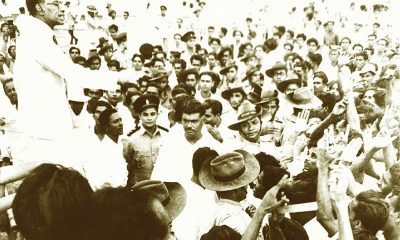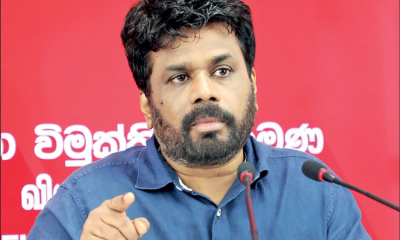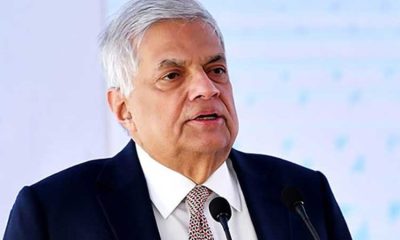Features
Ranil is running out of time and tricks, now it’s time the people had their say

by Rajan Philips
The first part of the title needs no elaboration. The second part is an unfolding question that has many answers to it, and which one of them will eventually prevail also depends on multiple factors. Objective circumstances, agency roles and subjective leadership moves are all at play. The simplest way to exit in politics is to resign. No amendment, no majority, or no referendum is needed.
The last President, Gotabaya Rajapaksa, unwittingly established a new precedent in Sri Lankan politics when he resigned from office after running away from it. All that said, Sri Lankans could also be thankful to Mr. Rajapaksa for leaving the way he did, unlike say Benjamin Netanyahu in Israel whose belligerence has created the most explosive situation for the region and the world in the 21st century.
No one is expecting President Wickremesinghe to resign before his carryover term from his predecessor is over. But there are plenty of speculations and suspicions about Mr. Wickremesinghe’s political intentions and the tricks that he might play to extend his stay in power. When it comes to elections, no matter what elections, no one has a clue about what the President is going to do. The truth is even the President may not be knowing what he is going to do, because he is constantly looking for winning conditions for him to call an election.
The tricks he plays!
For Ranil Wickremesinghe, winning conditions are hard to come by. Absolute power has come to him late in life, but there is no assurance of winning an election in spite of his powers and even after such a long time in politics. The alternative to not winning an election is not to have an election. Or keep changing election timing to improve winning chances. President Wickremesinghe has been trying everything. And he has everyone else chasing whatever election rabbit he pulls out of his scheming cap.
He cancelled the local government elections without saying anything about it, while letting everyone else agitate over it. He floated the idea about provincial council elections to keep everyone guessing. He got his sidekicks to spread rumours about advancing the presidential election even though as an interim president he is not entitled to do so.
Then came suggestions that he might try to advance the timing through a constitutional amendment. That was a dead end move because there was never going to be two-thirds majority support for it in parliament, where the opposition parties have been clamouring for parliamentary elections to be held after local government elections.
The one power that the President now has is to dissolve parliament and have new parliamentary elections. Mr. Wickremesinghe will not do that because he cannot put together a winning coalition, and the MPs who are supporting him in parliament now are scared to face an election. So, he opens a new window for distraction – electoral reforms, which have now taken a life of their own with the gazetted appointment of a Presidential Commission that is tasked to complete its work before April, unwittingly, but also fittingly for April Fools day, 2024!
In between came suggestions for abolishing the presidency, because the President is said to have figured out that he is not likely to get more than 50% votes on the first count, and he is not going to be high in the second or third preferences of those who are not going to vote for him in the first place. Put another way, Ranil Wickremesinghe is not the first, second or third best presidential candidate to a majority of Sri Lankan voters. That seems to be the assessment of all the president’s men. Hence the move to abolish it, as the last resort.
Mr. Wickremesinghe has played the abolition card before – in the dying days of the yahapalana government, when he suggested abolition after the UNP decided on Sajith Premadasa as its presidential candidate for the November 2019 presidential election. It became a laughing proposition then. Even Mangala Samaraweera laughed out loud.
This time, Anura Kumara Dissanayake has made a brilliant counter proposition that a constitutional amendment to abolish the ‘executive presidency’ should be coupled with the dissolution of parliament leading to a new general election.
The election itself could be coupled with a referendum on abolishing the executive presidency. To be clear, abolishing the executive presidency means only removing the elected presidency and reducing its powers to those appropriate for a head of state in a parliamentary democracy. To be clear as well, such a reform of the presidency should not require a referendum, as argued expertly by Dr. Nihal Jayawickrama in the Sunday Island last week.
Even so, there will be no harm in piggybacking a referendum question on presidential reform during a parliamentary election. A clear referendum result will put an end to a very longstanding question. In any event, the abolition kite never took off, let alone flew.
Finally, the nation, or nations, heard from the horse’s mouth that there will be elections, that is the presidential and parliamentary elections as and when they are due. Addressing the Special General Convention of the United National Party at the Sugathadasa Indoor Stadium in Colombo, last Saturday (October 21), President Wickremesinghe reportedly “outlined the timeline for upcoming elections in line with the constitutional provisions” – presidential election in 2024, followed by parliamentary elections, and local government elections in the first half of 2025. One would think that the President was not merely repeating the constitutional timeline for presidential and parliamentary elections which most people know, and that he was implicitly confirming that the two elections will be held as they come due.
Many are understandably skeptical and unsure if the President is being sincere or whether he is pulling another fast one. Like how he shooed away the local government elections. The sudden appointment of a new, nine-member commission on election reforms headed by former Chief Justice Priyasath Dep, certainly reinforces people’s skepticism about the President’s sincerity.
The specific tasking of the commission to make study the potential for enabling concurrent representation in both the parliament and the provincial councils is yet another example of Mr. Wickremesinghe’s presidential panache for making seemingly innovative, but which are in fact nonsensical suggestions. This might be the reason why there seems to have been no mention of provincial council elections at the UNP convention. There may not be any mention of them at all until we find out if the President is serious about enabling elected representatives to be concurrent members of both the parliament and the provincial councils.
Smart Dekma
Let us look at it another way. The theme of the UNP convention was “Smart Country – 2048.” One would have thought that country has seen the last of such cliches after the sensational collapse of Gota’s “Saubhagyaye Dekma” nonsense. Now we have the new Ranil version – Smart Country 2048, in pure English. Thankfully, it is not being splashed across the country as the Gota prototype was.
That is also because the UNP now is mostly a one-man state show. It does not have the prop up of 6.9 million who voted for Gotabaya Rajapaksa or 5.5 million who voted for Sajith Premadasa. Put another way, Smart Country has little chance of blossoming into a winning national platform.
My point here is something else. 2048 is the President’s target year for Sri Lanka reaching economic self-reliance and take off. With all the focus on the digital, the take off could turn out to be a virtual one. To make this a real one many concrete steps and short flights will have to be taken for the next 25 years starting from now. But we haven’t heard anything by way of a concrete plan or program from the President. Nor has the President demonstrated that he is assembling a political team that is worthy of the grand economic project that he claims he is launching.
There is nothing transparent about the team the President might be having outside parliament. And everything is transparent about the team of MPs that he has in parliament – their corruption, incompetence and their becoming increasing unelectable. The President has not articulated anything about whether the current political system and the institutional machinery are adequate for the grand purpose of delivering economic liberation by 2048.
Nor has there been any hint of what might come after him, for after all he is not expecting to be around till the day of deliverance in 2048. All that the country has had from him, politically speaking, is one trick after another to scupper one election or another. The last of them is the President’s recitation of the election timeline at the UNP convention.
So, it is understandable that there are criticisms and concerns that the President is pulling another fast one on the people. And the political counter to the President’s manoeuvres and machinations has already started. The time for fast ones is over, and there should not be any more postponement of elections. The President’s manoeuvres are likely to be countered both within parliament and outside parliament.
The opposition parties could request the Election Commission to make early announcement of election timelines – voter registration, nominations, and polling date, to keep the pressure on the President not to cancel or postpone the presidential election or the parliamentary election. The forthcoming budget process and debate could be used to ensure that sufficient funds are allocated for the two elections, and to get repeated commitments from the President that there will be no budgetary excuses to cancel or postpone either the two national elections.
Next to resigning or retiring, the most straightforward exit from power is electoral defeat. Ultimately the people will decide if President Wickremesinghe deserves to stay in office beyond the five year term for which Gotabaya Rajapaksa was elected in November 2019. Mr. Wickremesinghe’s best argument for the people’s vote is that he has managed to restore economic stability from the chaos that was handed to him. But the stability that he is now presiding over is tenuous at best and will not be sustainable when the country starts repaying its debts.
He may have deserved an extended stay in power to look after the economy if he had just done that – look after the economy without playing tricks with elections. Instead, President Wickremesinghe has been using and abusing the power of his office either to avoid facing the electoral test or to bolster his electoral prospects. Now it is time the people got their turn to exercise the power of their vote to say who shall be the next President or who will form the next government.
Features
SL urged to use GSP+ to the fullest to promote export development
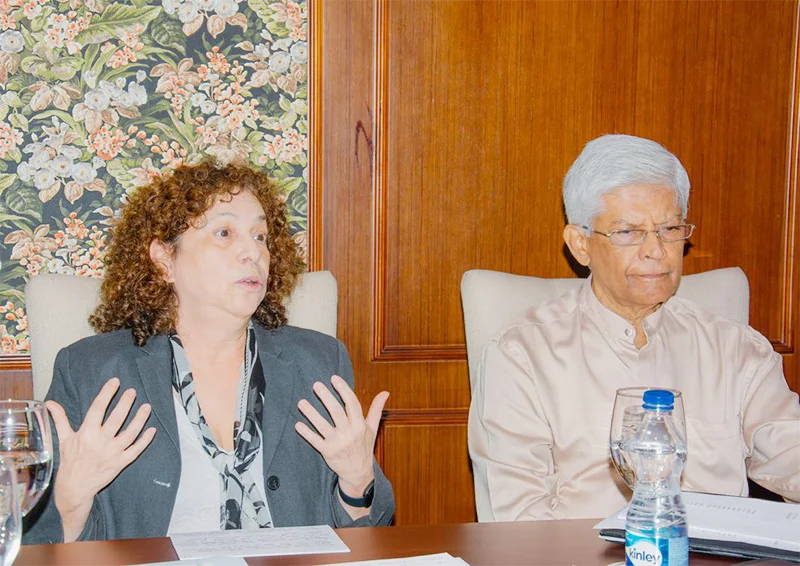
 Sri Lanka needs to take full stock of its current economic situation and use to the maximum the potential in its GSP+ facility for export sector growth. In the process, it should ensure that it cooperates fully with the European Union. The urgency of undertaking these responsibilities is underscored by the issues growing out of the recent US decision to sweepingly hike tariffs on its imports, though differentially.
Sri Lanka needs to take full stock of its current economic situation and use to the maximum the potential in its GSP+ facility for export sector growth. In the process, it should ensure that it cooperates fully with the European Union. The urgency of undertaking these responsibilities is underscored by the issues growing out of the recent US decision to sweepingly hike tariffs on its imports, though differentially.
These were principal ‘takes’ for participants in the Pathfinder Foundation’s Ambassadors’ Roundtable forum held on April 8th at the Colombo Club of the Taj Samudra. The main presenter at the event was Ms. Carmen Moreno Raymundo, Ambassador of the European Union to Sri Lanka and the Maldives. The forum was chaired by Ambassador Bernard Goonetilleke, Chairman, Pathfinder Foundation. The event brought together a cross-section of the local public, including the media.
Ms. Moreno drew attention to the fact Sri Lanka is at present severely under utilizing its GSP+ facility, which is the main means for Sri Lanka to enter the very vast EU market of 450 million people. In fact the EU has been Sri Lanka’s biggest trading partner. In 2023, for instance, total trade between the partners stood at Euros 3.84 billion. There is no greater market but the EU region for Sri Lanka.
‘However, only Sri Lanka’s apparel sector has seen considerable growth over the years. It is the only export sector in Sri Lanka which could be said to be fully developed. However, wider ranging export growth is possible provided Sri Lanka exploits to the fullest the opportunities presented by GSP+.’
Moreno added, among other things: ‘Sri Lanka is one among only eight countries that have been granted the EU’s GSP+ facility. The wide-ranging export possibilities opened by the facility are waiting to be utilized. In the process, the country needs to participate in world trade in a dynamic way. It cannot opt for a closed economy. As long as economic vibrancy remains unachieved, Sri Lanka cannot enter into world trading arrangements from a strong position. Among other things, Sri Lanka must access the tools that will enable it to spot and make full use of export opportunities.
‘Sri Lanka must facilitate the private sector in a major way and make it possible for foreign investors to enter the local economy with no hassle and compete for local business opportunities unfettered. At present, Lanka lacks the relevant legal framework to make all this happen satisfactorily.
‘Sri Lanka cannot opt for what could be seen as opaque arrangements with bilateral economic partners. Transparency must be made to prevail in its dealings with investors and other relevant quarters. It’s the public good that must be ensured. The EU would like to see the local economy further opening up for foreign investment.
‘However, it is important that Sri Lanka cooperates with the EU in the latter’s efforts to bring about beneficial outcomes for Sri Lankans. Cooperation could be ensured by Sri Lanka fully abiding by the EU conditions that are attendant on the granting of GSP+. There are, for example, a number of commitments and international conventions that Sri Lanka signed up to and had promised to implement on its receipt of GSP+ which have hitherto not been complied with. Some of these relate to human rights and labour regulations.
‘Successive governments have pledged to implement these conventions but thus far nothing has happened by way of compliance. GSP+ must be seen as an opportunity and not a threat and by complying with EU conditions the best fruits could be reaped from GSP+. It is relevant to remember that GSP+ was granted to Sri Lanka in 2005. It was suspended five years later and restored in 2017.
‘The importance of compliance with EU conditions is greatly enhanced at present in view of the fact that Sri Lanka is currently being monitored by the EU with regard to compliance ahead of extending GSP+ next year. A report on Sri Lanka is due next year wherein the country’s performance with regard to cooperating with the EU would be assessed. The continuation of the facility depends on the degree of cooperation.
‘A few statistics would bear out the importance of Sri Lanka’s partnership with the EU. For example, under the facility Sri Lanka benefits from duty free access in over 66% of EU tariff lines. The highest number of tourist arrivals in Sri Lanka in 2023 was from the EU’s 27 member states. Likewise, the EU’s 27 member states rank second in the origin of inflows of foreign exchange to Sri Lanka; with Italy, France and Germany figuring as the main countries of origin. Eighty five percent of Sri Lanka’s exports to the EU market benefits from GSP+. Thus, the stakes for the country are high.’
Meanwhile, President, In-house Counsel & Legal Advisor, The European Chamber of Commerce of Sri Lanka, John Wilson said: ‘GSP+ should be seen as not only an opportunity but also as a necessity by Sri Lanka in the current international economic climate. ‘Implementation of local laws is what is needed. Considering the pressures growing out of the US imposed new tariff regime, a good dialogue with the EU is needed.
‘Sri Lanka’s level of business readiness must be upped. Among the imperatives are: An electronic procurement process, Customs reforms, a ‘National Single Window’, stepped-up access to land by investors, for example, a clear policy framework on PPPs and reform of the work permits system.’
It ought to be plain to see from the foregoing that Sri Lanka cannot afford to lose the GSP+ facility if it is stepped-up economic growth that is aimed at. It would be in Sri Lanka’s best interests to remain linked with the EU, considering the aggravated material hardships that could come in the wake of the imposition of the US’ new tariff regime. Sri Lanka would need to remain in a dialogue process with the EU, voice its reservations on matters growing out of GSP+, if any, iron out differences and ensure that its national interest is secured.
Features
SENSITIVE AND PASSIONATE…
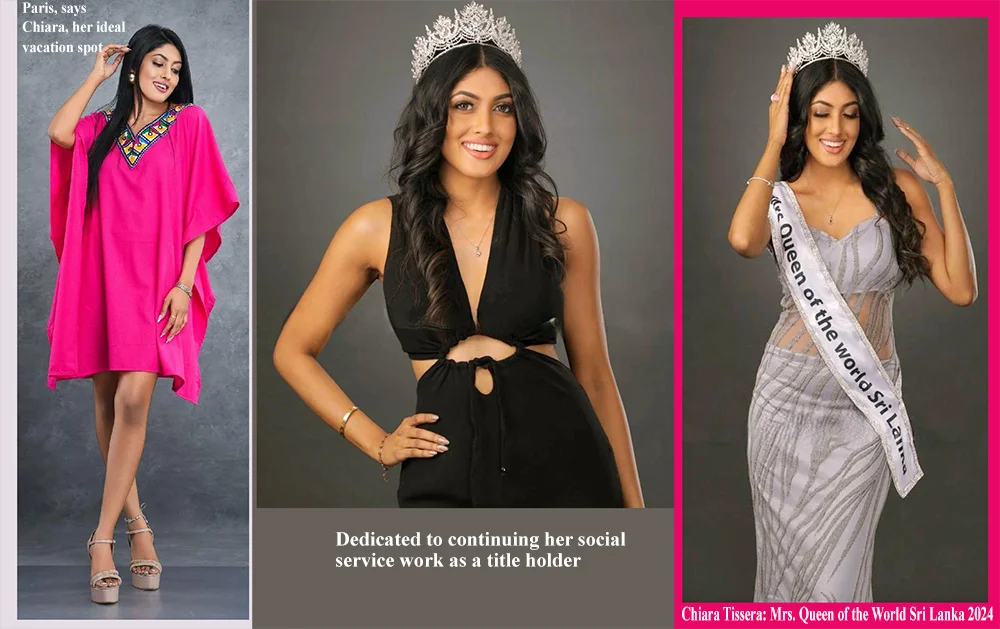
Chit-Chat
Chiara Tissera
Mrs. Queen of the World Sri Lanka 2024, Chiara Tissera, leaves for the finals, in the USA, next month
I had a very interesting chat with her and this is how it all went:
1. How would you describe yourself?
I am a sensitive and passionate individual who deeply cares about the things that matter most to me. I approach life with a heart full of enthusiasm and a desire to make meaningful connections.
2. If you could change one thing about yourself, what would it be?
Actually, I wouldn’t change a thing about myself because the person I am today, both inside and out, is the result of everything I’ve experienced. Every part of me has shaped who I am, so I embrace both my strengths and imperfections as they make me uniquely me.
3. If you could change one thing about your family, what would it be?
If there’s one thing I could change about my family, it would be having my father back with us. Losing him six years ago left a void that can never be filled, but his memory continues to guide and inspire us every day.
4. School?
I went to St. Jude’s College, Kurana, and I’m really proud to say that the lessons I gained during my time there have shaped who I am today. My school and teachers instilled in me values of hard work, perseverance and the importance of community, and I carry those lessons with me every day. I was a senior prefect and was selected the Deputy Head Prefect of our college during my tenure.
5. Happiest moment?
The happiest moment of my life so far has been winning the Mrs. Sri Lanka 2024 for Queen of the World. It was a dream come true and a truly unforgettable experience, one that fills me with pride and gratitude every time I reflect on it.
6. What is your idea of perfect happiness?
Happiness is a deeply personal and multifaceted feeling that often comes from a sense of contentment, fulfillment and well-being. For me, perfect happiness is in moments of joy, peace and accomplishments … and also being surrounded by my loved ones.
7. Are you religious?
Yes, I’m a very religious person. And I’m a firm believer in God. My faith guides me through life, providing strength, dedication and a sense of peace in every situation. I live by the quote, ‘Do your best, and God will do the rest.’
8. Are you superstitious?
I’m not superstitious. I believe in making my own decisions and relying on logic and faith rather than following superstitions.
9. Your ideal guy?
My ideal guy is my husband. He is compassionate, understanding and is always there to support me, no matter what. He’s my rock and my best friend – truly everything I could ever want in a partner.
10. Which living person do you most admire?
The living person I admire the most is definitely my mummy. Her strength, love and unwavering support has shaped me into who I am today. She is my role model and she inspires me every day with her wisdom and kindness.
11. Your most treasured possession?
My most treasured possession is my family. They are the heart of my life, providing me with love, support and strength. Their presence is my greatest blessing.
12. If you were marooned on a desert island, who would you like as your companion?
I would like to have my spouse as my companion. Together, we could make the best of the situation, supporting each other, sharing moments of laughter and finding creative ways to survive and thrive.
13. Your most embarrassing moment?
There’s quite a few, for sure, but nothing is really coming to mind right now.
14. Done anything daring?
Yes, stepping out of my comfort zone and taking part in a pageant. I had no experience and was nervous about putting myself out there, but I decided to challenge myself and go for it. It pushed me to grow in so many ways—learning to embrace confidence, handle pressure, and appreciate my own uniqueness. The experience not only boosted my self-esteem but also taught me the value of taking risks and embracing new opportunities, even when they feel intimidating.”
15. Your ideal vacation?
It would be to Paris. The city has such a magical vibe and, of course, exploring the magical Eiffel Tower is in my bucket list. Especially the city being a mix of history culture and modern life in a way that feels timeless, I find it to be the ideal vacation spot for me.
16. What kind of music are you into?
I love romantic songs. I’m drawn to its emotional depth and the way they express love, longing a connection. Whether it’s a slow ballad, a classic love song or a more modern romantic tune these songs speak to my heart.
17. Favourite radio station?
I don’t have a specific radio station that I like, but I tend to enjoy a variety of stations, depending on my mood. Sometimes I’ll tune into one for a mix of popular hits, other times I might go for something more relaxing, or a station with a certain vibe. So I just like to keep it flexible and switch it up.
18. Favourite TV station?
I hardly find the time to sit down and watch TV. But, whenever I do find a little spare time, I tend to do some spontaneous binge – watching, catching whatever interesting show is on at that moment.
19 What would you like to be born as in your next life?
Mmmm, I’ve actually not thought about it, but I’d love to be born as someone who gets to explore the world freely – perhaps a bird soaring across continents.
20. Any major plans for the future?
Let’s say preparing and participating in the international pageant happening in the USA this May. It’s an exciting opportunity to represent myself and my country on a global stage. Alongside this, I am dedicated to continuing my social service work as a title holder, striving to make a meaningful difference in the lives of others through my platform.
Features
Fresher looking skin …

 The formation of wrinkles and fine lines is part of our ageing process. However, if these wrinkles negatively impact appearance, making one look older than they actually are, then trying out some homemade remedies, I’ve listed for you, this week, may help in giving your skin a fresher look.
The formation of wrinkles and fine lines is part of our ageing process. However, if these wrinkles negatively impact appearance, making one look older than they actually are, then trying out some homemade remedies, I’ve listed for you, this week, may help in giving your skin a fresher look.
* Banana:
Bananas are considered to be our skin’s best friend. They contain natural oils and vitamins that work very perfectly to boost our skin health. Skincare experts recommend applying the banana paste to the skin.
Take a ripe banana and mash a quarter of it until it becomes a smooth paste. Apply a thin layer of the banana paste on your skin and allow it to sit for 15 to 20 minutes before washing it off with warm water.
* Olive Oil:
Olive oil works as a great skin protector and many types of research suggest that even consuming olive oil may protect the skin from developing more wrinkles. Olive oil contains compounds that can increase the skin’s collagen levels. Yes, olive oil can be used as a dressing on your salads, or other food, if you want to consume it, otherwise, you can apply a thin layer of olive oil on your face, neck and hands and let it stay overnight.
* Ginger:
Ginger serves to be a brilliant anti-wrinkle remedy because of the high content of antioxidants in it. Ginger helps in breaking down elastin, which is one of the main reasons for wrinkles. You can have ginger tea or grate ginger and have it with honey, on a regular basis.
* Aloe Vera:
The malic acid present in Aloe Vera helps in improving your skin’s elasticity, which helps in reducing your wrinkles. Apply the gel once you extract it from the plant, and leave it on for 15-20 minutes. You can wash it off with warm water.
* Lemons:
Lemons contain citric acid, which is a strong exfoliant that can help you get rid of your dead skin cells and wrinkles. Also, as an astringent and a cleansing agent, it helps to fade your wrinkles and fine lines. You can gently rub a lemon slice in your wrinkled skin and leave it on for 10-15 minutes. Rinse afterwards and repeat this process two to three times a day.
* Coconut Oil:
Coconut oil contains essential fatty acid that moisturises the skin and helps to retain its elasticity. You can directly apply the coconut oil, and leave it overnight, after gently massaging it, for the best results.
-

 Business3 days ago
Business3 days agoColombo Coffee wins coveted management awards
-

 Business5 days ago
Business5 days agoDaraz Sri Lanka ushers in the New Year with 4.4 Avurudu Wasi Pro Max – Sri Lanka’s biggest online Avurudu sale
-

 Features4 days ago
Features4 days agoStarlink in the Global South
-

 Business6 days ago
Business6 days agoStrengthening SDG integration into provincial planning and development process
-

 Business5 days ago
Business5 days agoNew SL Sovereign Bonds win foreign investor confidence
-

 Features1 day ago
Features1 day agoSri Lanka’s Foreign Policy amid Geopolitical Transformations: 1990-2024 – Part III
-

 Features4 days ago
Features4 days agoModi’s Sri Lanka Sojourn
-

 Midweek Review1 day ago
Midweek Review1 day agoInequality is killing the Middle Class


